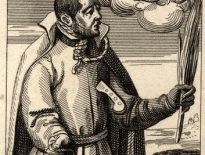On this day in Tudor history, 30th November 1529, the feast of St Andrew, Henry VIII was reproached by the two women in his life: his wife, Catherine of Aragon, and the woman he wanted to marry, Anne Boleyn.
Catherine of Aragon was not impressed by the way her husband was treating her, and Anne Boleyn didn't like the fact that the king was letting Catherine get the upper hand. They both told the king exactly what they thought. It was not a good day for King Henry VIII.
Find out exactly what happened with Henry VIII, Catherine of Aragon and Anne Boleyn on this day in 1529, in today's talk.
The 30th November is also the Feast Day of St Andrew the Apostle and was an important day in Mary I’s reign - click here for more on that.
Also on this day in history:
- 1554 – Both Houses of Parliament presented a petition to Mary I and her husband Philip to intercede with Cardinal Reginald Pole, the papal legate, for absolution for the years of separation from Rome and for reconciliation with Rome. Pole then absolved England and restored it to the Catholic fold, pronouncing “Our Lord Jesus Christ, which with his precious blood has redeemed us, and purified all our sins and pollutions, in order to make himself a glorious bride without stains and without wrinkle, whom the Father made chief over the church, he through his mercy absolves you.”
- 1554 – Birth of Philip Sidney, the poet, courtier and soldier, at Penshurst Place in Kent. Sidney is known for his famous work “Astrophel and Stella”.
- 1558 – Death of Elizabeth Howard (née Stafford), Duchess of Norfolk, eldest daughter of Edward Stafford, 3rd Duke of Buckingham, and wife of Thomas Howard, 3rd Duke of Norfolk. Her marriage to Norfolk broke down after he took Elizabeth (Bess) Holland as a mistress in 1527. She gave evidence against her husband when he was accused of treason in 1546, and she bore Mary I's train at her coronation in 1553. Elizabeth was buried in the Howard Chapel at St Mary's Church, Lambeth, now a garden museum.
- 1577 – Execution of Cuthbert Mayne, Roman Catholic priest, at Launceston in Cornwall after refusing to accept Elizabeth I as supreme head of the church in England. He was hanged, drawn and quartered, and his head was put on display on the gate of Launceston Castle and his quarters sent to Bodmin, Barnstaple, Tregony and Wadebridge as a warning to others.
- 1601 – Elizabeth delivered her famous Golden Speech to the House of Commons, to address their concerns over England’s economic state of affairs. It was the last speech that she gave to Parliament, and in it she spoke of her position as Queen and her love and respect for her realm and for her members of Parliament. Find out more about it in an article here.



Leave a Reply